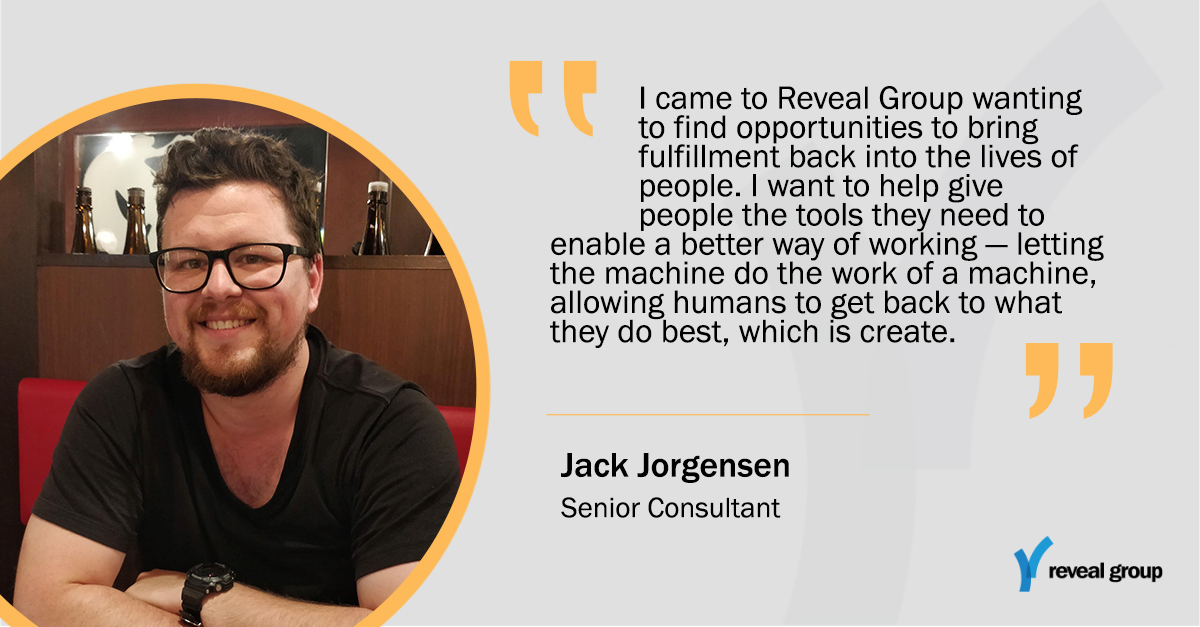
Life at Reveal Group
What led you to working in the automation space?
Since I was a kid, I’ve always had a knack for machines and figuring out how they operate. My formal qualifications are in audio engineering but my love for technology was always in the foreground. So, years ago, I was working on a project where my team was highly overwhelmed with repetitious, low value work. Working incredibly long hours, it was a very high stress environment, and I really wanted my team to start adding value to the business and getting that capacity back to themselves. I taught myself to automate SAP, Excel, and Outlook and once I got the hang of things, we then started to see results quickly; this was really my catalyst into RPA! The impact on the team from automating those processes really inspired me to look at how we can work better, how we can focus on getting people home on time to see their loved ones, and basically getting that capacity back into their lives.
We decided to see if the capacity from those processes hadn’t been created in the team. If so, we would have missed a massive amount of opportunity due to my teammates having their focus fixated on something which didn’t really add value to them or to the business because it was essentially just button pushing with not a lot of decision logic.
That momentum spiraled up and eventually I joined Reveal Group! I came in wanting to find opportunities to bring fulfillment back into the lives of people. I wanted to help give people the tools to enable a better way of working, letting the machine do the work of machine, allowing people to get back to what they do best, which is create.
All in all, I kind of fell into RPA because automation was something my team really needed. I figured it out and it just made a lot of sense to me. Within a very short time period, we automated a massive amount of processes within that business. You could see impact in people’s lives and the impact on their work because they weren’t having to stress about something they really shouldn’t need to stress about.
What are some of the most exciting automation projects you have worked on?
I found them all exciting in their own way, as they’ve all been completely different. The one that really stands out the most was the first automation I built. It was a very simple process in SAP; it was quite special to me as it was intertwined for the team’s benefit, I got to witness firsthand how those individuals grew as a result. This automation essentially reduced the team’s workload by a third (eight people’s workload was down by a 1/3 per person). Which enabled everyone to develop new skills and a lot of them were able to boost their careers as a result because they weren’t totally bogged down in nominal nonsense.
What are the driving forces that keep you intertwined with automation?
I have a very deep, ingrained belief that the way people work is usually devoted to highly repeatable tasks which doesn’t give people the ability or capacity to be creative, to explore themselves more, and how they can grow as a person. I find automation is an avenue which allows this capacity to be created, allowing people to transfer tasks to a machine so they can get back to being creative human beings. It’s as simple as that for me. I know some people have the belief “if we do all this, the business is going to get this result” and they look at it from that kind of ROI. But for me, I’ve seen firsthand how it actually works for people, which is that they get that capacity and stress removed from them because they don’t have to just sit there button-pushing, doing boring work. They can start being creative and this is where the return to the business comes.
What are the most exciting applications you foresee for RPA?
Sky’s the limit here I would say! The current applications in RPA that I think are being underutilized is in supply chain and education. In these industries, there are highly, repeatable processes occurring daily. For supply chain, you’re doing order receive, order back, filing away invoicing, exc. In education, you’re on boarding students, dealing with timetabling, and a lot of high scale repeatable tasks. I could certainly see RPA fitting in there, making these processes a lot more simple. I think the next phase of RPA is going to be highly two streamed, where you’ve got RPA devs carrying a larger business initiative and then team members who’ve been able to build their own automations to provide a bottom-up approach to solving those bottlenecks. In this way you’ve got a spear team driving the larger business initiative and your general day-to-day employees who are building where they see their bottlenecks in those smaller spaces.
Another major area I’m starting to see being realized in the RPA space is businesses realizing the quality of work actioned by RPA tools. A lot of it originally was to free up that capacity, whereas now as that time goes on, they are seeing the quality of that work is being returned where they’re not having to worry about if something is a mistake or not.
Are there any common misconceptions about adopting automation in the workforce?
When I thought about this question, two misconceptions really stood out to me. One being, automation will take away jobs and, in my experience, this is not the case. I see RPA as an extension of the person in that by automating a process or part of one, it provides capacity back to those people, allowing them to add value back to the business, which would not have otherwise been there. It’s like a household appliance; dishwashers and washing machines don’t remove the need to clean dishes or clothes, but they make those tasks significantly easier, less labour intensive, more efficient and higher quality. It allows us to spend more time doing things which bring enjoyment and fulfillment in everyone’s personal lives. I’ve definitely understood why some people put their backs ups to automation when they believe their job is being replaced by this but in my experience, this is not the case.
Another misconception is the amount of automation required to see a difference. Most businesses are pleasantly surprised to see big improvements from automating smaller processes thanks to compounding ROI in those small processes, especially those which are low complexity. This frees stuff up team members from mundane and repetitions tasks and gives them greater time concentrating and considering the bigger picture. There are a lot of businesses looking for the bigger, broader, “big bang for your buck” business initiative and then they end up spending 12 to 20 weeks building something out. Sure, it does deliver, but you can get just as big of a ROI on a smaller process, faster delivery that’s going to return for a longer period.
What advice would you give to someone looking into a career in Intelligent Automation?
Be curious. Curiosity in how a process came to be, how it’s impacted the team, what instructions are being given to an application to perform an action, and what decisions the user is making all to get the outcome. By being curious about how it all fits together and how all those puzzle pieces work, that’s going to be an important piece into making that journey a smooth one. I would listen to stakeholders/subject matter experts to really understand what they need as opposed to telling them what they need. Then I would focus on the person and how this automation is going to impact their life. Some people will look at automation as a risk – It’s our responsibility to address this with kindness and to help them understand we’re not here to make their lives more difficult; we’re here to enable them with new tooling.
For those who are just starting off their careers in RPA and wanted to stand out to potential employers, I would start looking at the width of technologies that are around you.
It’s easy for you to learn a new RPA software but by understanding the underlying technologies which enable that, it means the skill is transferable between all those major partners. It also helps you to solve problems and challenges within the tool because you understand how it works at a fundamental level. Getting a large width in your technical understanding is key. You don’t need to know a lot about all of the tooling but understanding the core of what it all is, is definitely something that’s going to help someone stand out from the crowd.
Are there any hobbies/interests of yours that you’ve seen becoming integrated with RPA?
I’m going to keep this one specific because all of my hobbies and RPA lineup; we could sit here for hours talking about it. I’m going to narrow it down to this; I love machine learning. I find it fascinating how we’re able to use this technology to make higher quality decisions. It’s making continually bigger impacts in areas like data analysis, document understanding, object detection and image recognition. We’ve got some highly capable machine learning developers within the business, and it’s nice to see all of that come to life.
Interested in working for Reveal Group? Click here to view our current openings: Company – Reveal Group
